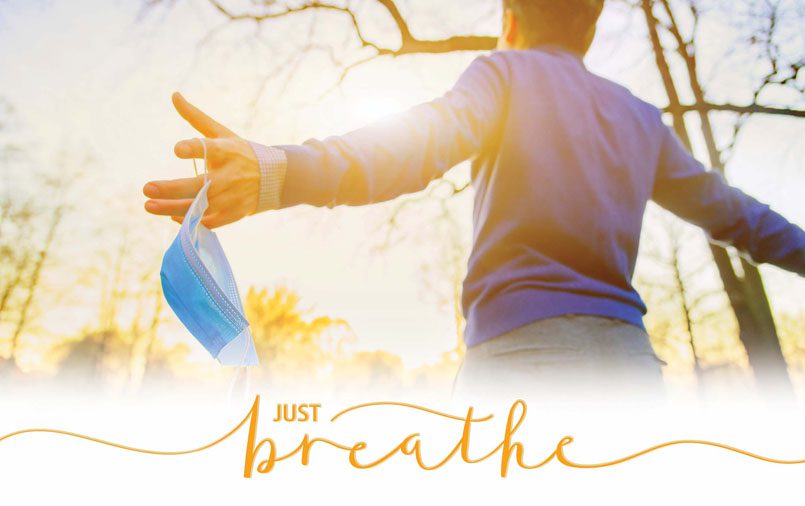30 Sep 2021 The first step to health and wellness begins with a breath
By Mark McDonald
Throughout COVID-19, I have explored many new ways of maintaining health and wellness. I’ve tried many methods of prayer and meditation, a gratitude journal, new exercising, a silent retreat, fasting, and dieting. And of course, I’ve binged TV, spent too much time on meaningless social media, ate too much, and avoided physical activity. Obviously, some worked better than others for my health and wellness. Overall, I believe I made it through COVID-19 fairly well and actually grew stronger in many ways.
Or so I thought.

When the second wave came, I had made some big life changes and found myself in what felt like unfamiliar territory. I knew the drill – wash your hands, wear a mask, and watch your distance – but I wasn’t ready for the unrest that having another round of COVID-19 would bring to my spirit, to my soul. I was literally and figuratively in a different place, and I panicked. I fell into what psychologists call my “default mode network.”
Some estimate that we make around 35,000 decisions a day and virtually all of them are subconscious decisions. In other words, we run our lives on autopilot. It helps us juggle all the things that make us busy, but it can also cause us to revert to behaviors that are short-sighted and impulsive. We often think that the things that help (such as eating right, exercise, and rest) are suddenly out of reach, so we default to the quickest thing we can find to make us feel good (eating junk food, working more, and sleeping less.)
That is what happened to me. While I had found a whole new level of peace in my life in 2020 through all my intentional changes, they seemed to go out the window when the COVID-19 resurgence of 2021 came back and I was in a different situation. My impulsive, reflexive reactions worked against me, and it seemed like I was destined to lose my health and wellness I had only recently rebuilt.
Then, I ran across the concept of the “default mode network,” and I read about how there is one thing that helps us avoid falling into the bad choices that can come in stressful times. It can literally change the way our body regenerates cells: meditation.
I know that some people think meditation is a new-age tool that isn’t founded in reality, but I had learned through experience that meditation is one of the tenets of my faith tradition. Prayer isn’t just talking to God; it is listening for God. Psalm 46:10 says it most succinctly: “Be still, and know that I am God” (NRSV). In fact, the Psalms speak of the necessity and power of meditation more than a dozen times. Meditation is stillness that focuses on the present moment and helps us find God in that moment. Busyness creates the opposite. It focuses on the worries of the past and the fears of the future, and it also centers our attention on ourselves. That causes us to act impulsively and to search for the quickest way out instead of the best way through.
Scientists have found that meditation (the moments we grow still and focus intentionally on the present) actually creates new growth in the brain that helps us make better decisions. A few moments each day of stillness and silence can help us get back to a new and improved “normal.”
I invite you to join me in a simple step that brings health and wellness that is both spiritually and scientifically proven. Breathe. Find a time to stop, breathe, and meditate on the present moment for about 20 minutes. If that seems too difficult, start with two or three minutes, then keep adding a couple minutes each day. Just breathe and listen to what is happening around you, not on what has happened previously or what might happen next. Search for the holy in that moment.
Then, make the good choices that you already know bring you health and wellness.
- The beginning of the Christmas season - December 3, 2023
- Faith at the center of it all - February 28, 2023
- The spiritual connections between the Maker and makers - August 31, 2022









